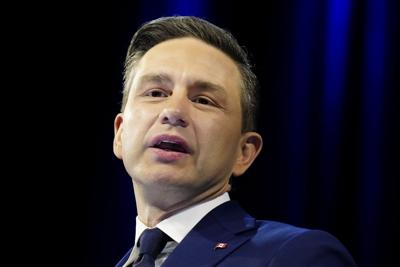As moral victories go, Conservative Leader Pierre Poilievre may be justifiably proud to have shamed the Liberals into reversing themselves on several significant policy errors in recent months â even if his tireless efforts didnât translate to a set of keys to the Prime Ministerâs Office. Yet while moral victories might keep the NDP afloat, Conservatives play to win.
Despite Poilievreâs luxurious lead time and his partyâs bottomless chequebook, electoral victory never came, and two worthy schools of thought will emerge in the wake of a shocking few weeks.
Poilievre fans will fairly trumpet that his 41 per cent vote share is the Toriesâ highest since 2003, when the Canadian Alliance and Progressive Conservative parties merged to form the current Conservative Party of Canada.
With NDP support having fallen by two-thirds, thereâs no question that Poilievre faced an uphill climb, given traditional progressive voting patterns. Iâm not a fan of Poilievreâs âBoots Not Suitsâ slogan, but his unrelenting focus on working-class audiences appears to have paid off in traditionally tough ridings around Hamilton, Sudbury and Windsor â and thatâs a fabulous building block.
Without U.S. President Donald Trump as his foil, itâs unclear what Mark Carney would have pitched to voters beyond pinky-promising to deliver on refried Liberal announcements, plus ideas he lifted from the Conservatives, such as reversing the job-killing increase to the capital gains tax rate.
Another distinguishing feature of this election is that it was the first in 18 consecutive outings in which the federal party that won the most seats in Quebec wasnât led by a man born in that province. Carney can thank Trump for that assist. Meanwhile, Jamil Jivani, the Tory MP for BowmanvilleâOshawa North, Ontario Premier Doug Ford for âsabotaging the Conservative campaignâ in Canadaâs largest province.
For the Tory candidates who suffered a 30-point negative swing in less than four months, a combination of anger, disappointment and confusion will reign. Do they blame Trump? Their Leader? His campaign team? The media? Back-biting from Fordâs camp?
Some members of the âwoulda, coulda, shouldaâ crowd will argue that one of Poilievreâs key errors was to demean former Progressive Conservative leader Jean Charest during the leadership race in 2022, when it would have been so easy to let him lose with dignity. Had Poilievre embraced Charest and recruited him to be his Quebec lieutenant, would French Canadian voters have had somewhere else to turn besides Carney? Charestâs presence might also have mollified voters who are clearly more comfortable with the Progressive Conservative tradition, including in places like Nova Scotia, where Premier Tim Houston just netted another majority government.
Another key missed opportunity was the decision not to trek down to Washington to meet with Vice-President JD Vance, in private, to show worried voters that Poilievre could play pro ball. Ford got points for trying.
The Conservative team raised $77 million over a two-year period, but that historic haul didnât translate to an effective âcarpet bombingâ pre-writ ad buy, as promised. And some party donors are asking why the few members of the business community who did throw their hats into the ring, such as CI Private Wealthâs Robert Pierce, werenât showcased so as to counter the media narrative that Team Carney had a monopoly on âreal-world experience.â
Thereâs also the subjective quality of âlikability.â Following a day of door-knocking in a very competitive midtown pc28čÙÍűriding last week, former Conservative deputy leader Lisa Raitt , âWhat theyâre not thrilled about, unfortunately, is our leader.â That Poilievreâs positioning didnât win over viable pc28čÙÍűridings but did flip a bunch of suburban 905 seats warrants objective analysis.
that Stephen Harperâs 2011 majority reflected a political ârealignmentâ of the Canadian populace, clear-eyed Tories will recall that it was the late NDP leader Jack Laytonâs popularity that delivered 10 seats to the Conservatives in pc28čÙÍűand overwhelmed the Liberals in Quebec. The Tory message fell short again this week in Canadaâs largest city, as it has for decades, but Poilievre and his wife have the opportunity to spend the next 12 to 24 months ensuring that the partyâs GTA candidates win more tight races next time.
Just over a year ago, I explained to Star readers that Poilievreâs âsuperpower was that he just doesnât care what âweâ (elites) might think of him.â He set his sights on winning over those who turn wrenches for a living, and the strategy worked.
Despite losing his seat, Poilievre has earned the right to âlearn the lessonsâ of this campaign, as he promised supporters he would on election night.
His next challenge is to grow the tent.





















To join the conversation set a first and last name in your user profile.
Sign in or register for free to join the Conversation